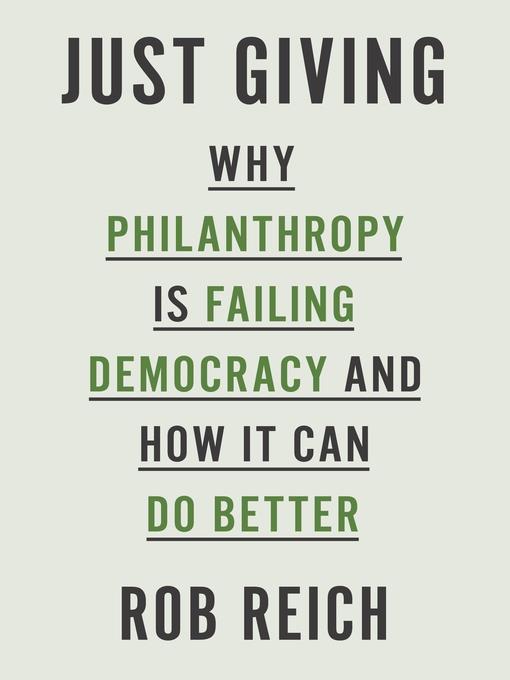
Just Giving
Why Philanthropy Is Failing Democracy and How It Can Do Better
کتاب های مرتبط
- اطلاعات
- نقد و بررسی
- دیدگاه کاربران
نقد و بررسی

September 24, 2018
Surveying philanthropy from ancient Athens to the modern-day Rockefeller Foundation, and political philosophers from John Stuart Mill to John Rawls, Stanford political science professor Reich (Education, Justice, and Democracy) mounts a wide-ranging critique of charity and the government preferments that subsidize it. Far from an unalloyed good, he contends, charitable giving is often “an exercise of power and plutocratic voice that warrants democratic scrutiny.” Charitable tax deductions subsidize the gifts of rich people more than those of ordinary people; most charitable giving doesn’t go to the needy and doesn’t reduce inequality (some of it, like parental donations to affluent public schools, worsens inequality); and giant philanthropic foundations impose the obsolete priorities of their long-deceased donors on society for centuries, “the dead hand extend from beyond the grave to strangle future generations.” However, Reich points out, charities and foundations do have other virtues, such as pursuing idiosyncratic causes and long-term social-policy experiments that governments and markets don’t explore. His reform agenda suggests tax credits instead of deductions, foundation life spans, and lots more pondering of what charities should do. Although his writing is rather dry and academic, Reich gives a lucid, thought-provoking analysis of the public impact of charity.

October 1, 2018
Reich (political science, Stanford Univ.) asks what the relationship between the state and philanthropy in a democratic society should be, and urges the development of a political and moral philosophy of philanthropy. After examining ancient philanthropic models and the attitudes of several philosophers regarding their foundations, Reich scrutinizes contemporary practices and the redistributive record of private, perpetual, tax-exempt charitable organizations. He criticizes knee-jerk praise of charitable giving and questions whether current tax exemptions for powerful nonprofits and their wealthier donors that don't necessarily benefit those in need are just and equitable or actually contrary to democratic principles. He encourages a discussion of the role of philanthropy in a liberal society and how to redirect legislation by encouraging peer regulation or investment in long-term projects that benefit future generations. Some of the material here was published previously in journal articles and book chapters, but Reich reworks the information to appeal to nonscholars, hoping they will put more thought into theories of philanthropy. VERDICT Recommended for philanthropists, nonprofit leaders, policymakers, and anyone interested in political science, economics, and philosophy.--Margaret Kappanadze, Elmira Coll. Lib., NY
Copyright 2018 Library Journal, LLC Used with permission.

























دیدگاه کاربران